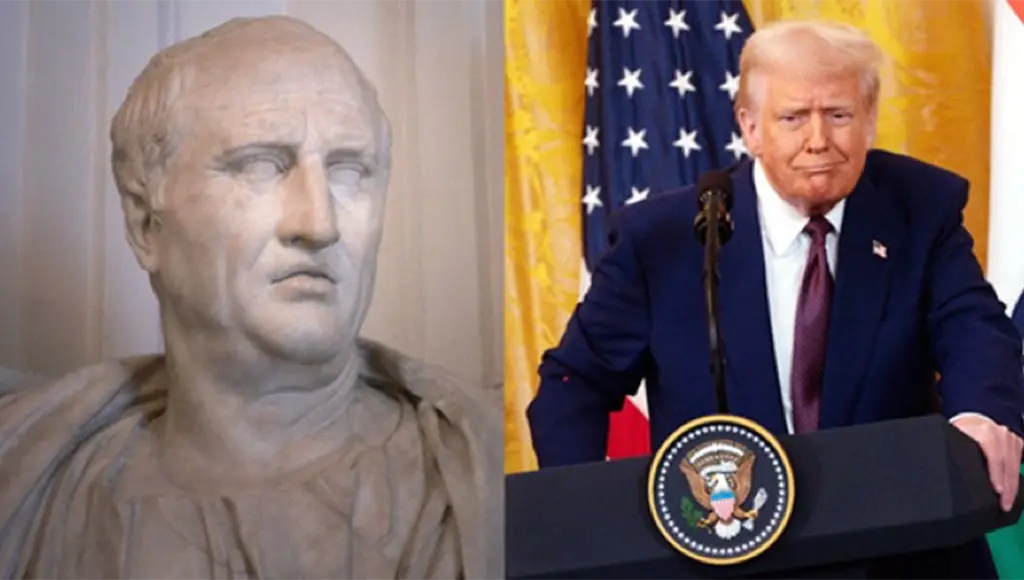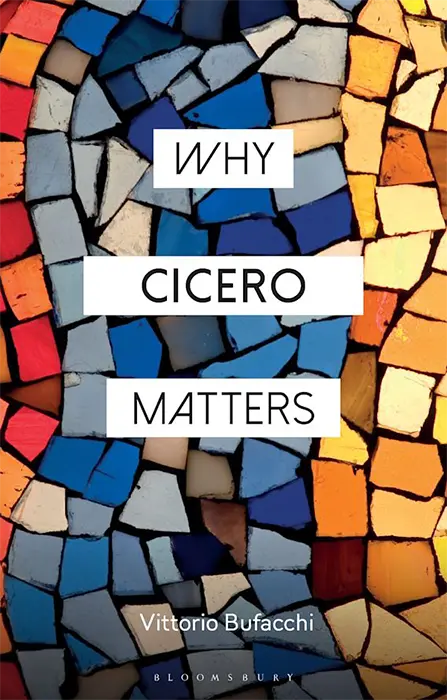In This Section

The Challenge
All the SDGs, from ‘No Poverty’ to ‘Good Health and Well Being’, ‘Gender Equality’ to ‘Decent Work’, ‘Climate Action’ to ‘Peace, Justice, and Strong Institutions,’ are premised by one assumption: democracy. Without democracy, SDGs would be meaningless. Today, our democracy is under threat. Recent elections across the world have seen a rise in populist authoritarian leaders and the far-right. We need to remind ourselves of why democracy matters.
My research, on Roman philosopher Cicero, is not just about events in Ancient Rome, it’s about us, our democracy. My research is about why the humanities matter, why philosophy matters, why classics matter, and, of course, why Cicero still matters.
My research is not aimed at scholars of Ancient Rome, or academic philosophers. It is written in an accessible style, the aim is to be inclusive and not exclusive. Cicero lived through the end of the Roman Republic, a constitutional system based on elections that has informed all modern democracies. But it came to an end after 450 years, replaced by dictatorships. We are running the same risk today, so my research is about how we can learn from Cicero, and perhaps we can avoid making the same mistakes as our Roman ancestors.
The Research
The original research, which started with the publication of my book Why Cicero Matters (Bloomsbury 2023), was a mix of classics, philosophy, history, and politics. But the project developed since then; what started as just another academic book has grown into a small phenomenon.
Shortly after the book was published in October 2023 (the book was sold out before the day it was launched!) I was interviewed on the radio in Ireland (RTÉ Radio 1) and in Italy. I did many podcasts interviews. I wrote articles on Cicero for newspapers (Irish Examiner) and opinion platforms (RTÉ Brainstorm; The Conversation UK). I was interviewed by a French newspaper. But most of all, I engaged with a wide audience at two festivals, in Dublin (ClassicsNow, February 3, 2024) and Newcastle, UK (ClassicsFest, May 15, 2025). The event in Newcastle is already sold out, and it’s not even free: £10 per ticket.
Finally, I’m currently working with three TV producers to prepare a pitch for a television documentary on Cicero and democracy, to be filmed in the US. While this is still in the pipeline, it is evidence that my research on Cicero has attracted the attention of many people outside the Ivory Tower.
The Impact
 It is very difficult, and very rare, for humanities to have an impact in modern society. To the extent that research in humanities has any impact, it tends to be a very slow process over a very long time. That’s very different from other subject-area in the social sciences like economics or law. And yet, this project, Why Cicero Matters, has defied all expectations. In a short space of time, my project has reached a very wide readership, and it’s still going strong.
It is very difficult, and very rare, for humanities to have an impact in modern society. To the extent that research in humanities has any impact, it tends to be a very slow process over a very long time. That’s very different from other subject-area in the social sciences like economics or law. And yet, this project, Why Cicero Matters, has defied all expectations. In a short space of time, my project has reached a very wide readership, and it’s still going strong.
It all started with my book Why Cicero Matters (2023), which received many good reviews in peer-reviewed publications (Knowledge Production), including in the prestigious ‘Notre Dame Philosophical Reviews’. A symposium on my book is also forthcoming.
But its biggest impact has been its Social & Cultural Impact. The book has gained a growing readership outside the university classroom. I was interviewed by Oliver Callan on The Nine O’Clock Show on RTÉ Radio 1, and I was interviewed by Irish Times columnist Kathy Sheridan in front of a live audience at the ClassicsNow festival in Dublin (February 2024).
In May 2025 there will be a three-days festival in Newcastle UK, where I’ll be the keynote speaker, entirely devoted to Cicero. Not only that, this year the organizers of this festival decided to call the festival after the title of my book, ‘Why Cicero Matters’. In mid-May I was interviewed on British media, including BBC Radio Newcastle.
In February 2025 I wrote a piece for The Conversation UK on “A Short History of the Separation of Powers: From Cicero’s Rome to Trump’s America”. Within a few days this piece was translated in French, and I was interviewed by a French journalist for another article. My The Conversation UK piece was also reprinted as an OpEd in a newspaper in Minnesota, USA.
The attention that my research has attracted adds to the vitality and sustainability of UCC’s strategic goals in teaching and learning, external engagement, and internationalization. There is nothing more important for a university than its reputation. The impact of my research on Cicero and modern democracy, both within and outside of academia, adds to the reputation of the university. The articles I have published, the interviews I have done, the festivals I have attended as a speaker, all bring visibility to the university.
My Why Cicero Matters research project is also a potent reminder of the importance of the humanities, not only within universities, but for society. My work on Cicero is about the privilege of living in a democracy, imperfect as it may be, and how we risk losing it because of our apathy, because of the general sense of complacency about democracy. My project is about instilling a sense of political urgency because we, living in liberal democracies, are under serious threat. The election of Donald Trump could destabilize the international political order, and Ireland is not immune to the wave of authoritarian populism that is sweeping around the world, as Conor McGregor’s rising star reminds us.
My research is a reminder that philosophy matters, that the humanities matter, that books matter, and that more resources need to be invested in those disciplines that are too often left behind in our modern efficiency-driven, immediate-impact-possessed, technology-obsessed society.
For More Information
Professor Vittorio Bufacchi can be reached at v.bufacchi@ucc.ie or visit his homepage www.vittoriobufacchi.com
You can follow him on Facebook (https://www.facebook.com/vittorio.bufacchi) or X (@BufacchiV) or Instagram (@vittoriobufacchi).
“this short book offers a superb introduction to Cicero’s political and philosophical thought, yet is also a thought-provoking meditation on the rise of authoritarian populism today”.
– Victoria Rimell, Professor of Latin, University of Warwick, UK
College of Arts, Celtic Studies & Social Sciences
Coláiste na nEalaíon, an Léinn Cheiltigh agus na nEolaíochtaí Sóisialta
Contact us
College Office, Room G31 ,Ground Floor, Block B, O'Rahilly Building, UCC
